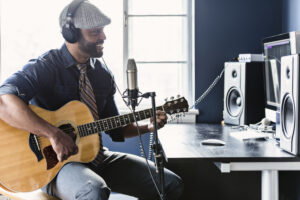
A major component of studying music is learning how to get comfortable with public performances or recitals. Great private music teachers help to prepare a student not only to play their pieces skillfully in the lesson or practice session, but to remain composed and confident when sharing music with others. Our Lessons in Your Home teachers are all avid performers who have their own tips and tricks for recitals (whether virtual or in-person). The performance mindset is something that is explored extensively in our private music lessons.
The Performance Mindset
First and foremost, I never tell my students “Oh don’t be nervous!” for upcoming concerts and performances. The reason for this is that while the phrase is well-intended, it never helps! Almost everyone gets nervous before a performance because this is a natural, involuntary stress response in the body. Acknowledging that nerves are natural and often unavoidable will help a performer know what to expect when they do occur. The best performers welcome their nerves, rather than fight them or wish them to go away.
Training For A Musical Performance Long Term
Obviously, the first part of getting ready to play in a concert is preparing the music. It is vital to be able to play a piece without stopping or repeating notes when mistakes occur. This can be very difficult for some people. In many other parts of life, we are expected to go back and fix our mistakes, but that can’t happen on stage. Practice with the intent of performance, so you know how to play or sing everything successfully at the first attempt.
Training For A Musical Performance The Weeks Before
Once a student is aware of the possibility of nervousness, we discuss how to use a variety of techniques, practices, and routines to increase the level of comfort with the feelings of nervousness. The first of these occurs in the lead-up to a performance. Students should practice performing their pieces for others or for recordings, so that they can get accustomed to the nervous feeling. This has the added benefit of showing the student which parts of a piece don’t feel as comfortable or don’t go as well when nerves are involved. These passages can be practiced with special attention for physical comfort. Practicing small things ahead of time – like walking on stage, bowing, and beginning a piece – can be very helpful for the performance day.
In the few weeks leading up to a concert, you want to be sure you are only checking spots or running through pieces or movements. I would not suggest practicing several hours a day in the week leading up to the performance. Just like an athlete preparing for a game or event, you will want your recital or audition to line up with your peak performance, not with the end of your preparation.
Additionally, students can visualize the venue and what will occur when they walk on stage. I often suggest closing your eyes, picturing yourself backstage, then walking on stage to applause, and then preparing to begin the piece. Then be sure to hear the whole piece in your mind and go through the motions without the instrument. This kind of mental preparation helps to make the performance day seem much more ordinary when it arrives.
Prepare For A Musical Performance The Day Of
It is important to have a clear routine set out for the performance day. It can be helpful to think about preparing as if you are an athlete. Get a good sleep the night before, eat healthy meals beforehand, and drink enough water. I was once told that eating bananas helps with nerves, and while I don’t know if that is scientifically proven, I make it a part of my concert day routine. Know what you’re going to wear and how it feels to play in that outfit. Also, know how you’re getting to the venue and be sure to get there around an hour early if that is possible.
After years of performing, I know that I don’t like to be very busy the day of a performance, but I also really hate having nothing to do the whole day until the concert. If I’m just sitting around thinking about it all day I start to feel worse and worse. Instead, I suggest going on walks, listening to music to get you excited, and having meals with friends or family. In terms of practicing that day, most performers and teachers suggest doing a long, relaxed warm-up and checking spots. DON’T play through long pieces in their entirety – you want to save your energy.
What To Do Right Before A Musical Performance
Continue to visualize the performance and to hear your music while backstage. I know some people who jump around to get out their excess energy, while I prefer to stand still and use mindfulness breathing techniques (such as meditation or box breathing) to calm my body and mind. Additionally, it is helpful to remember that though you may feel quite nervous, you should strive to have fun and share your music with the audience – the audience is there to enjoy your music and wants you to succeed!
Contact Us
If you’ve always wanted to play and perform, but have been intimidated by nerves and performance anxiety, reach out to Lessons in Your Home to be paired with a private music teacher in the DC area who can guide you to become comfortable with sharing music with others! Our teachers come right to your home for every lesson, plus we offer virtual music lessons, too. Our online music lessons are taught by local music teachers with live lessons tailored to your family!
By Emily Doveala